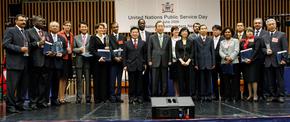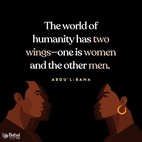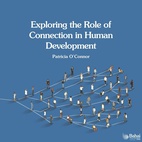The views expressed in our content reflect individual perspectives and do not represent the authoritative views of the Baha'i Faith.
On June 19, 1913, Abdu’l-Baha, in the course of his speech on the rooftop of the Hotel Sultani in Port Sa’íd, Egypt, proclaimed and exclaimed: “And universal peace — in what Book is this written?”
The promotion and eventual establishment of world peace is one of the clearest — and among the foremost — principles of the Baha’i Faith. Its prophet and founder, Baha’u’llah, revealed:
We have enjoined upon all mankind to establish the Most Great Peace — the surest of all means for the protection of humanity. The sovereigns of the world should, with one accord, hold fast thereunto, for this is the supreme instrument that can ensure the security and welfare of all peoples and nations. They, verily, are the manifestations of the power of God and the daysprings of His authority. We beseech the Almighty that He may graciously assist them in that which is conducive to the well-being of their subjects.
RELATED: Our Goal? Be the Change We Want to See in the World
In the writings of his revelation, Baha’u’llah clearly stated that “the peace of all who dwell on earth” is “among the principles and ordinances of God”:
The purpose of religion as revealed from the heaven of God’s holy Will is to establish unity and concord amongst the peoples of the world; make it not the cause of dissension and strife. The religion of God and His divine law are the most potent instruments and the surest of all means for the dawning of the light of unity amongst men. The progress of the world, the development of nations, the tranquility of peoples, and the peace of all who dwell on earth are among the principles and ordinances of God. Religion bestoweth upon man the most precious of all gifts, offereth the cup of prosperity, imparteth eternal life, and showereth imperishable benefits upon mankind. It behooveth the chiefs and rulers of the world, and in particular the Trustees of God’s House of Justice, to endeavor to the utmost of their power to safeguard its position, promote its interests and exalt its station in the eyes of the world.
Today, the wars in places like Ukraine and South Sudan dramatically accentuate the agonizing absence of world peace. Baha’u’llah revealed how the world should respond to these kinds of violent travesties in clear and unambiguous terms:
Now that ye have refused the Most Great Peace, hold ye fast unto this, the Lesser Peace, that haply ye may in some degree better your own condition and that of your dependents.
O rulers of the earth! Be reconciled among yourselves, that ye may need no more armaments save in a measure to safeguard your territories and dominions. Beware lest ye disregard the counsel of the All-Knowing, the Faithful.
Be united, O kings of the earth, for thereby will the tempest of discord be stilled amongst you, and your peoples find rest, if ye be of them that comprehend. Should any one among you take up arms against another, rise ye all against him, for this is naught but manifest justice.
In the course of his travels to Europe and North America from 1911—1913, Abdu’l-Baha — Baha’u’llah’s son and successor — privileged, prioritized, and presented specific Baha’i principles to Western audiences. He sometimes reframed those very same principles in terms that were more understandable to Westerners — saying that world peace necessarily depends on the eradication of prejudice:
The aim of the Baha’is is to raise aloft the banner of the world’s Great Peace, to eradicate the foundations of war and conflict throughout all regions, to gather together all the divers nations and peoples beneath the single-hued Tabernacle of God, and to eliminate prejudice — whether racial, national, religious, sectarian, or political — from the face of the earth, so that all countries may become as one country, all races as one race, and all nations as one nation. Thus may the world of creation attain unto peace and tranquillity.
In his “First Tablet to The Hague,” written on December 17, 1919, Abdu’l-Baha referred to the recent world conflagration of World War I, which was deeply imprinted on the minds of his immediate audience:
This recent war has proved to the world and the people that war is destruction while universal peace is construction; war is death while peace is life; war is rapacity and bloodthirstiness while peace is beneficence and humaneness; war is an appurtenance of the world of nature while peace is of the foundation of the religion of God; war is darkness upon darkness while peace is heavenly light; war is the destroyer of the edifice of mankind while peace is the everlasting life of the world of humanity; war is like a devouring wolf while peace is like the angels of heaven; war is the struggle for existence while peace is mutual aid and cooperation among the peoples of the world and the cause of the good pleasure of the True One in the heavenly realm.
There is not one soul whose conscience does not testify that in this day there is no more important matter in the world than that of universal peace. …
Therefore Baha’u’llah, fifty years ago, expounded this question of universal peace at a time when He was confined in the fortress of Akka and was wronged and imprisoned. He wrote about this important matter of universal peace to all the great sovereigns of the world, and established it among His friends in the Orient. …
Among His teachings was the declaration of universal peace. People of different nations, religions and sects who followed Him came together to such an extent that remarkable gatherings were instituted consisting of the various nations and religions of the East. Every soul who entered these gatherings saw but one nation, one teaching, one pathway, one order, for the teachings of Baha’u’llah were not limited to the establishment of universal peace. They embraced many teachings which supplemented and supported that of universal peace.
RELATED: The Only Solution to Our Economic Problems: The Oneness of Humanity
Here, Abdu’l-Baha emphasized the interrelatedness of each and every one of Baha’u’llah’s social principles as part and parcel of providing a rock-solid and enduring foundation for world peace.
The Universal House of Justice pointed out that several of these social principles are dynamically related to the issue of world peace, as explained in their 1985 open letter “To the Peoples of the World,” which calls out the barriers to world peace — racism, the great disparity between rich and poor, unbridled nationalism, and religious strife. Baha’is believe that important prerequisites for peace include the equality of the sexes, universal education, improved global communication, unity, consultation, and conflict resolution.
Baha’is all around the world work for the establishment of these primary principles every day, making the Baha’i Faith a global force for peace.

















Comments
Sign in or create an account
Continue with Googleor